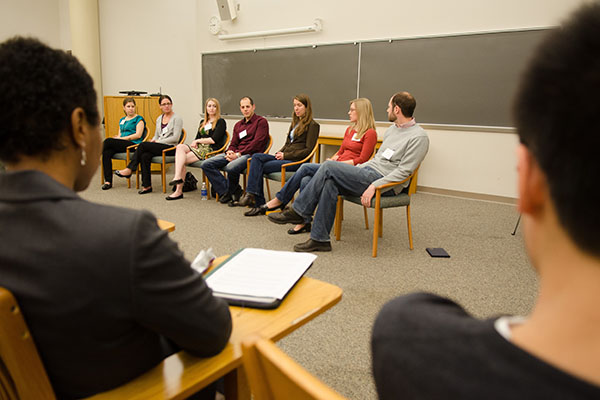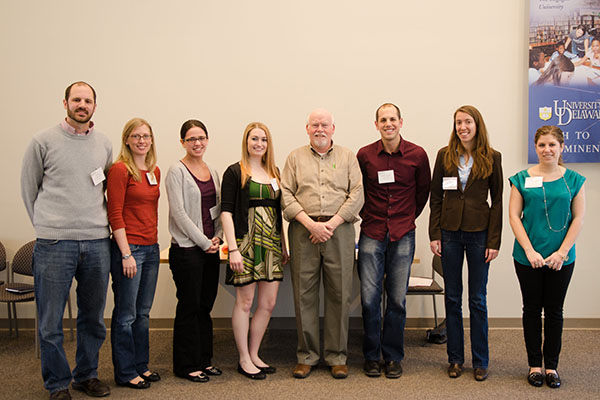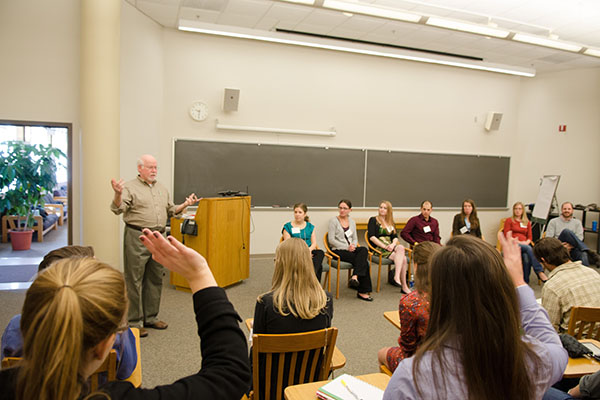


Environmental careers
UD alums return to campus to share insights into environmental careers
8:41 a.m., March 15, 2013--University of Delaware students interested in pursuing environmental careers had the opportunity to learn from UD alumni who are now professionals in various environmental fields at the second annual Environmental Career Morning held on Saturday, March 9, in Townsend Hall.
The seven panelists at the Environmental Career Morning included:
Campus Stories
From graduates, faculty
Doctoral hooding
- Maia Tatinclaux, a graduate student studying environmental engineering at the University of Maryland;
- Samantha Loprinzo, associate at ICF International;
- Matthew Loaicono, market analyst at Monitoring Analytics;
- Kristen Atwood, research assistant at ICF International;
- Chelsea Halley, environmental scientist at the Site Investigation and Restoration Section of the Delaware Department of Natural Resources and Environmental Control;
- Kristen DeWire, assistant attorney general in the Office of the Attorney General, Maryland Department of the Environment; and
- Alex DeWire, environmental scientist, Tetra Tech Inc.
The panel was moderated by Steve Hastings, professor and associate chair of the Department of Applied Economics and Statistics, who organized the event and taught all of the former students on the panel.
College of Agriculture and Natural Resources (CANR) Dean Mark Rieger was in attendance and he addressed the panelists, saying he was pleased to see all the alumni come back to help educate the current students. “Our graduates go out and do wonderful things and they change the world. So I’m so glad that you took the time to come back here and tell about your journey and how best to get from here to do that,” Rieger said.
The panelists talked about their personal experiences, ranging from trips to Cameroon with the Peace Corps to spending months working places part-time before finally landing a job in their desired field and, of course, the differences between college and the working world.
“Working and having a job and having bosses and deadlines, there are definitely higher stakes,” explained Atwood. “If you miss a paper, or if it’s a day late in college, you can apologize to the professor and maybe get a little markdown, but if you miss a deadline in the working world, it’s definitely a bigger deal. I had to learn how to keep better track of what I was working on and what I needed to get done.”
Loprinzo echoed those thoughts, saying, “You really have to be on top of your work and it’s important to set your own deadlines. You have to motivate yourself to get everything done and be organized enough to keep on top of everything.”
While the panelists did offer individual nuggets of wisdom, there were some pieces of advice that were universal. For instance, all the panelists agreed that taking some sort of communication or public speaking course while still at UD would be incredibly beneficial to the students.
“No matter what job you do, you have to be able to communicate well,” explained DeWire.
Tatinclaux agreed, saying, “Communicating and public speaking and being confident, that’s really important. Just in the interview process, it’s so important to be friendly, open and have a level of confidence when you’re talking to your potential employer because that goes so far.”
Loprinzo even talked about taking advantage of places on campus like the Career Services Center, as she explained that she went there as a student and took part in mock interviews to prepare for the real world interviews she would face.
Other important skills mentioned by the panelists were an understanding of statistics, the ability to manipulate large data sets and proficiency in software like statistical software and geographic information systems.
All of the panelists also stressed patience in applying for jobs and perseverance because with so many people applying for a finite number of jobs, it might take students awhile before they are hired. Loaicono explained that he applied for about 200 jobs before finally landing the one that he wanted.
Loaicono also said that when going in for an interview, it is important to learn about the company and to come up with 5-10 questions to ask about the firm during the interview. “The more you know about the company, the more that you’re interested in what they’re actually trying to do,” is beneficial, he said, adding, “Even if you know this is going to be a steppingstone, you definitely want to ask good questions.”
Other pieces of advice included looking at job descriptions posted on-line for “buzzwords” to be included in resumes, tailoring resumes every time to fit a particular company’s needs, attending career fairs and making connections, remembering names and faces and the importance of a master’s degree, while at the same time understanding the risks of incurring mountains of debt in student loans.
Halley, who graduated just one year ago, stressed that it is important for the students to take a wide range of courses while they are undergraduates, as it will help to inform them — like it did her — on what they like and what they don’t like.
“When I was choosing classes, part of me just wanted to take all science classes but I did branch out and take some economics classes. It is important to have that wide background and also to see what you like and what you don’t like. I took a wildlife course about birds and I hated it and it made me realize that I don’t want to work in fish and wildlife. But I didn’t know that until I took that course so I think you learn something from every course, whether it’s negative or positive.”
In the end Hastings summed it up for all those in attendance, saying that finding a career is “not a straight road. It’s a crooked road to get where you want to be and you just need to keep that in mind.” And though the road is crooked, he added that the crooked road can also be “kind of exciting, as well.”
Article by Adam Thomas
Photos by Danielle Quigley










